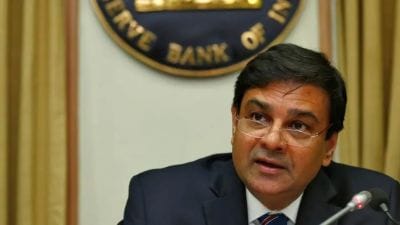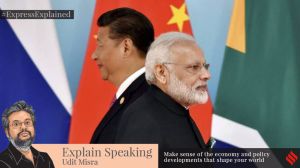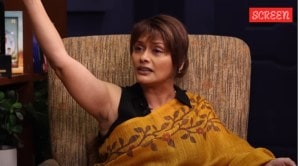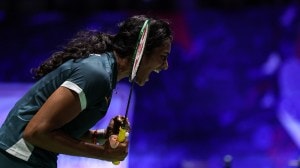Click here to follow Screen Digital on YouTube and stay updated with the latest from the world of cinema.
‘Sacred Games 2 was much stronger than Season 1’: Varun Grover on art vs artiste debate, responds Superboys of Malegaon criticism
In an exclusive conversation with SCREEN, Varun Grover responds to criticism directed towards Superboys of Malegaon, reflects on the polarised response to Sacred Games Season 2, and weighs in on the art versus artist debate.
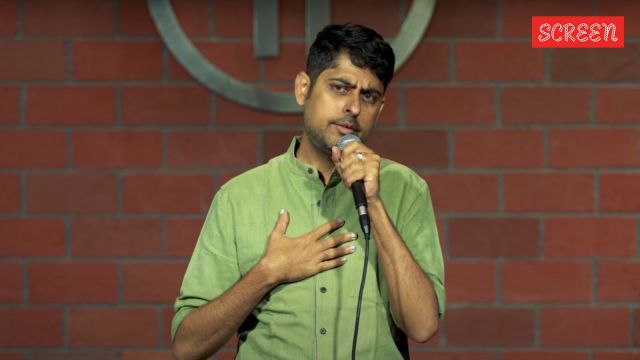 Over the past ten years, Varun Grover has written films such as Masaan, Sandeep Aur Pinky Faraar, Three of Us, All India Rank, Kiss, and Superboys of Malegaon.
Over the past ten years, Varun Grover has written films such as Masaan, Sandeep Aur Pinky Faraar, Three of Us, All India Rank, Kiss, and Superboys of Malegaon.It’s been quite a year for Varun Grover. On one hand, he wrote the much-acclaimed Superboys of Malegaon, which resonated widely with audiences. On the other, his short film Kiss premiered on MUBI and has been receiving praise from across the internet. Speaking of the internet, clips from his stand-up special Nothing Makes Sense have gone viral, even as he now tours with a new show titled Love, Death & Ketchup. Amid all this, Masaan, the film he co-wrote with Neeraj Ghaywan, turned ten this year, marking a decade since his official arrival. In an exclusive conversation with SCREEN, Grover reflects on how Masaan has aged for him, breaks down his writing process on films like Sandeep Aur Pinky Faraar, responds to critiques of Kiss and Superboys, and weighs in on the polarised reception to Sacred Games Season 2.
Excerpts, edited for clarity and brevity:
Technically, it’s been 10 years since your official debut as a screenwriter, with Masaan marking that milestone. How do you reflect on the past decade, the highs, the lows, and everything in between?
You become a screenwriter the day you come to Bombay and start writing. And that’s been, what, 20 years actually. In fact, 26 July 2005, the historic day Bombay was flooded, that iconic date in Bombay’s history, was the first time my TV credits came. I wrote something on TV for The Great Indian Comedy Show. That was 2005. And roughly around 2007 or 2008, I started writing my first film… commissioned work. There were three, four, five scripts that were commissioned, which I finished. A couple of spec scripts too, before I started writing Masaan in 2013. In late 2012, we went for a research trip to Banaras. And then, in 2013, we started writing. But even before that, I was always writing, or wanted to write. So yeah, let’s not get into the specific number of years. But it’s very tough being a screenwriter in this city — it’s very frustrating and humiliating at times.
But if you disconnect the screenwriting part from the feedback and the people you’re interacting with — on its own, it’s just beautiful. Just purely me and my script, me and my computer or me and my paper and pen. It’s the most fulfilling experience of life. If someone says, “Okay, you just write what you want and we won’t pay you. But we’ll make the film exactly the way you write it.” I’ll take that job. I’ll be like, “Okay, I don’t want any money, but you direct or produce whatever I have written without giving me any changes or feedback or something like that.” That will be a dream. But yeah, it’s very, very frustrating dealing with the world outside. As someone said, “I love the writing, but I hate the paperwork.” I love the writing, but I hate the process writing has to go through to become a film. That process is very draining.
When was the last time you watched Masaan?
I saw it recently at a festival in America.
And how has it aged for you personally, both as a piece of cinema and as something you wrote?
When I saw it back in 2015, a few times during the edit, then at various festivals, and then at the India release, at that time, I could only see the flaws in the writing. I could only see, “Okay, this could’ve been better,” or there were many, many things I didn’t like. But now, ten years later, when I feel fully dissociated from the film, if someone says, “You wrote this film,” I don’t know how. I can give you a very theoretical answer, but emotionally, I don’t know. I don’t know what kind of person I was at that time or why I wrote it the way I did. For me, detachment is a very important part of the writing process, so that I can move on to the next project. Now I’m fully detached. And for the first time, I can see it as a work of cinema, not written by me, but just someone who happens to share my name on the screen. And it’s someone I don’t really know, who is that person? I can now watch the film, critique it, appreciate it, or find flaws in it. I actually like the rawness of the film. The mistakes, which at that time really bugged me, now feel like part of its charm. That earnestness is still there. And that earnestness is still connecting with people. So I’d say, for me, it has aged really well.
And also, that’s the unfortunate truth, the reality the film depicts hasn’t changed much. The way it shows India, or Banaras, or the aspirations of a particular age group, and the problems they face, that’s still very relevant. Whether it’s someone coming from a Dalit caste, or a working woman, the kinds of problems they face now, that truth hasn’t changed.
There’s a moment in the song Tu Kisi Rail Si Guzarti Hai, when Vicky’s character releases a balloon, and Shweta Tripathi’s character responds by doing the same, that really reminded me of the iconic Palat scene from Aditya Chopra’s DDLJ.
Wow, okay, that’s a fantastic connection. Yeah, it is an interpretation of the same kind of moment, where you’re basically sending a sign, and then the sign is replicated or responded to by someone. Oh, it’s a great connection, I’d never thought of it that way. I was just extrapolating there… I mean, I don’t know exactly how or why I wrote that moment. But no, it was definitely not a conscious homage to that moment. That said, it could be, in the sense that I grew up on DDLJ and the romance of ’90s cinema, which had a lot of such moments.
 Neeraj Ghaywan with Varun Grover on the sets of Masaan.
Neeraj Ghaywan with Varun Grover on the sets of Masaan.
What’s your take on the ‘art versus artist’ debate? Do you find it possible to separate the art from the artist?
It’s very difficult; there’s no straight answer to this. I won’t say I always separate, or that I never do. There are certain art forms where I don’t think separation is possible, stand-up comedy is one of them. In stand-up, the art is the artist. The artist is the art. You’re not pretending to be someone else; you’re being your truest self. The more honest you are, the better the stand-up. So if a stand-up comedian turns out to be a problematic or morally questionable, then I can’t separate their comedy from who they are. With cinema, it gets fuzzier. First, because there are so many people involved in making a film. Say, the director turns out to be someone unethical or found guilty of something serious, it does leave a bad taste, especially if you’ve admired them. You feel betrayed. But there are also filmmakers or actors you’re not particularly invested in — and even if you learn something awful about them, you might still be able to watch the film, thinking about the ten other people who worked on it. However, if the person is alive, and especially if they double down and defend themselves in a horrible way, refusing accountability, in that case, it becomes very difficult to engage with their work.
Also, in cinema, a director can make 10–20 films across their career, and those stories might have nothing to do with their own personality. Unlike stand-up, which is very personal, cinema can be more detached. So for me, it’s a grey area. It’s always at the back of my mind. If I had to choose, for example, say there’s an actor like Kevin Spacey, who everyone now knows is a problematic person. If there’s a new film with a director I love, a writer I admire, a great cast, and Kevin Spacey is in it, will I watch it? I don’t know. It’s never a clean yes or no. I won’t pretend the problem doesn’t exist. There’s always an internal negotiation: Should I watch this or not? Should I support this or not?
Picking up on something you just said, do you believe that a film doesn’t always reflect a filmmaker’s politics or value system?
Um, not always, yeah. Again, there are so many reasons why people make films, especially in commercial cinema. Sometimes people do it just for the money. Sometimes they do it because they’re sitting idle at home and someone says, “Okay, do this,” and they go along with it. And sometimes, they don’t even know why they’re doing it, and that really shows in the film.
I read an interview with Smita Singh where she mentioned how producers often expect writers to “do the 2+2” for the audience, essentially spoon-feeding the narrative. But in a film like Sandeep Aur Pinky Faraar, which I personally think is your best screenplay, you resist that entirely. There’s even a massive banking scam at the center of the story, but you never lay it out explicitly. Was that a conscious choice?
I get what people mean when they say you have to do the 2+2 for the audience, but that was exactly why I wanted to work with Dibakar Banerjee. I knew he didn’t do that. The film didn’t do well commercially, but we believed in what we were trying to do. And it wasn’t about making a conventional thriller. The thriller element is there, but it’s more of a drama, more of a commentary on urban India and the hollowness, seen through the lens of class. And then we layered caste and gender into that. Because generally, in our society, there’s a kind of hierarchy, class, caste, gender, where men are typically above women, upper castes above lower castes, upper class over working class, and so on.
Here, the woman, Sandeep, was upper-class, upper-caste, and the man, Pinky, was a working-class constable, someone who had been fired from the police force, and also someone from a lower caste. That dynamic was something we really wanted to explore. We were also very sure we didn’t want to spoon-feed the audience. Because we felt we’re creating a world that is relatable, a world we see around us. I mean, there are banking scams every two or three years. And we actually made it all very elaborate. We worked with researchers, and designed a very detailed, believable scam. It was based on the idea of a government taking people’s PF (Provident Fund) money and investing it in a private company that eventually goes bust. So yes, we had it all fleshed out, but a lot of that detail was eventually removed, to keep the film more dynamic, and avoid overly explaining things. The connection between Parineeti’s character and her boss, the pregnancy, the way that all unfolds, we planted it all very subtly, and hoped the world we were building was engaging enough for people to catch those layers.
 Varun Grover shares that for Sandeep Aur Pinky Faraar, they had designed an elaborate banking scam.
Varun Grover shares that for Sandeep Aur Pinky Faraar, they had designed an elaborate banking scam.
With Kiss, the screenplay felt quite designed. At times, I could almost see the “writing” in the writing. Was that intentional?
When I watch Kiss again now, I definitely see a lot of flaws in the writing. I think it could’ve been much subtler. There are parts in the middle where things are very clearly explained, and yes, some moments do feel very “designed,” as you pointed out. At the time, I think I was in a bit of a hurry to make the film. I was impatient to start prep, and probably didn’t spend enough time refining the script. I got into that “let’s just begin” mode. Also, once you enter the process of making a film, it’s like being in a trance, slightly detached from reality. I’ve seen this with almost every director I know or have worked with. Before the shoot, you’re one person. But once you enter that 6–8 month window — from pre-production, shooting, and into editing — you become someone else. And honestly, that’s probably the only way to make a film: by fully immersing yourself in it, cutting off from the outside world. But the flip side is that you stop taking feedback. Because if you keep seeking input, you keep rewriting. And you’re already filled with so much self-doubt as a filmmaker or writer, it’s like consuming 24 grams of self-doubt every day, like it’s your protein bar.
So at some point, you have to cut yourself off and just go forward. In my case, I probably did that too soon. It was my first film as a director, and I stopped showing the script to more people out of fear. If I’d shown the script to more people, I’m sure the level of execution would’ve improved. If something was at 5, it might’ve gone to 7. If it was at 7, maybe it would’ve reached 9. But that’s the journey. And when you’re in that zone, not just as a writer or director but as someone steering the whole project, you can become not only rigid, but also difficult for people around you. That happened to me too.
View this post on Instagram
Supermen of Malegaon wasn’t as emotionally moving as I expected. I felt the direction played it a bit safe and didn’t fully explore the emotional core that was there on paper. But I did find it beautiful as a story of companionship, how cinema brings people together.
I completely agree with your reading. For me, the film didn’t feel like Malegaon at all. I think anyone who has actually been to Malegaon would immediately feel that disconnect. But even for someone who hasn’t, the word you used — sanitized — is quite accurate. That’s exactly what I felt too. It was clearly a creative choice by the director, the way the film looked, the production design, everything. But for me, it was a bit of a miss. The real Malegaon, its grit, its grime, the sadness of the place, was missing. And that’s important because the beauty of the documentary was how, through that sadness, emerged this group of people who were not heroes in any traditional sense. They weren’t larger-than-life, they were doing ordinary jobs, living ordinary lives, in the same difficult conditions.
Even in the writing, I felt there was a bit of heavy-handedness, for instance, the recurring motif of the airplane flying over Shashank Arora’s character’s head.
It was too much spoon-feeding on my part. And it was always written like that, so yeah. I fully take that.
 Varun Grover addresses some of the criticism directed towards Superboys of Malegaon
Varun Grover addresses some of the criticism directed towards Superboys of Malegaon
Recently, there was major controversy after the producers altered the ending of Raanjhanaa using AI. You posted a reel in response. Can you talk to me about your reaction to that?
I honestly don’t understand why anyone would want to change the ending of Raanjhanaa, or any film from the past, and re-release it. It’s just so stupid. People are already re-releasing older films and they’re doing fine, right? Sanam Teri Kasam was re-released and made money. Obviously, Raanjhanaa would make even more. The music is iconic. The characters are iconic. People remember so many details from that film. And there’s a whole generation now that never saw it on the big screen, they only saw it on cable or streaming. Now they want that big-screen experience, and with that music? It would be incredible in a theatre.
So even from a pure business standpoint, it makes no sense to alter a successful film. If a film had flopped because the ending didn’t work, then maybe, you could make some warped business logic argument for changing it. But this? It’s just plain stupid. Then, from a moral point of view, it’s completely unethical. You cannot just change the ending, or any part of a film, without the consent of the director, the writer, and ideally all the principal creative team. If you’re altering an actor’s lines, expressions, or likeness, it’s wrong on every level. I really hope the industry comes together and takes strong notice of this. Because where does it stop? Tomorrow, someone could re-release Mughal-e-Azam and change the names of the characters. Or worse, someone might add the climax of Hera Pheri to the ending of Guide.
I personally loved Sacred Games Season 2, I think it’s one of the most daring experiments in long-form storytelling. But there’s a larger perception that it didn’t connect with audiences the way Season 1 did. In your view, what didn’t work for Season 2?
Honestly, for me, Season 2 was better than Season 1. I really felt that. Of course, I understand there was a lot of outrage, it became a trend on Twitter. But the thing is, platforms like Twitter and Instagram aren’t always real indicators of audience feedback. Trends start, people jump on them to get more traction, and then opinion makers drive the narrative. But still, as a writer, looking at Season 2 objectively, I think it was much stronger than Season 1. It was more complex, darker, more ambitious. It tackled deeper themes and had a much sharper commentary on the world we live in. I really believe we delivered on a lot of that ambition. Neeraj Ghaywan, Anurag Kashyap, Vikramaditya Motwane, the way they directed and drove the show, it was incredibly strong work. So yeah, I was disappointed by the negative perception. But again, if you step outside the Twitter/Instagram echo chamber and just look at IMDb, both seasons are rated roughly the same, around 8.4. In fact, one of the episodes from Season 2 is among the highest-rated across both seasons.
It’s just unfortunate that the perception stuck. It felt like a loss, considering the effort we all put in to make something more layered. That said, I still stand by what we did. Season 1 was great, I love it, but it was more palatable, more accessible. After that kind of success, the only real thing to do is not play it safe. You have to be more ambitious. Take risks. If you just repeat the same thing because it worked once, then why are you even creating? Then why are you calling yourself an artist? I’d rather fail trying something new than coast on what’s already been done. Even if someone had told me upfront, “This is going to flop, you’ll get trolled,” I still wouldn’t have done it any other way.


Photos
- 01
- 02
- 03
- 04
- 05


